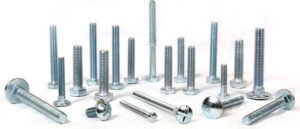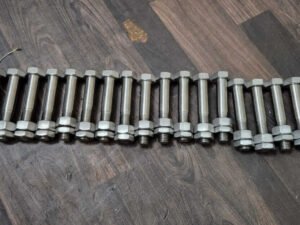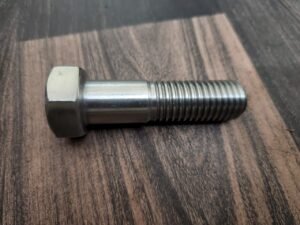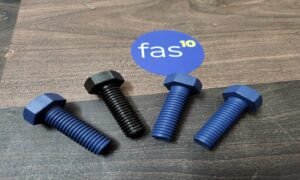A coating is a kind of surface treatment performed on fasteners. Today, with the advancement in technology, many fasteners are coated with modern yet smarter chemicals. They not only improve the corrosion resistance but also increase its service life all while delivering better and smoother performance.
Traditionally fasteners were coated or plated with a layer of zinc. Either within the sort of zinc electroplating or zinc coating in several colours employing a coat of zinc would offer a limited protection level. It, however, is interesting to notice that these methods would have a thinly coated layer of zinc on the surface of the fastener, which gets stripped off by simple abrasions that would be caused during either fastening or unfastening or maybe transportation and storage. Using galvanization rectifies this problem. Galvanization may be a process that needs a dip of products of various grades in zinc. This process ensures that the component receives a coat with a thick layer of zinc. In case, the fastener was to be abraded during its use – the thick layer of zinc – that surrounds its surface protects the Fastener.
Frequently utilized in the automotive industry, a Phosphate coat is thin and dull, with a greyish tint on the surface of fasteners. The immersion of the product takes place during a suspension that contains orthophosphoric acid. Though the chemical bath or solution makes provisions for low-intensity protection as compared to zinc coating in some environments, it proves to stand itself as a medium for painting and lubrication. However, for applications that are at a high risk of corrosion, the utilization of a Phosphate coat is highly discouraged. As an example , this finish isn’t ideal to use in marine applications. Yet, they’re the preferred choice to use in dry settings like vehicles or interiors of buildings, etc.
Cadmium plating, although rarely used – features a high level of toxicity and environmental non-acceptability. It offers marginally better protection when compared to zinc while providing increased lubrication properties. The aircraft industry is one among the sole users of this finish. Cadmium plating may be used as sacrificial coating for steel because – it readily takes a chromate conversion coating, which, in turn, improves the corrosion resistance. Above all, the plating’s galvanic properties can be compared to aluminum.
Another method of coating is to passivate fasteners by altering the chemical structure of the fasteners at or simply below the surface, to form more stable while ensuring that it doesn’t react with other elements in an undesirable way. Methods for passivation of fasteners include – anodizing, bluing, or chromium. Passivation by definition is the formation of a thick, natural, self-healing oxide layer that improves the fasteners’ corrosion resistance and wear resistance, while providing a far better adhesion for paint primers.
PTFE coatings (such as Xylan or Teflon) are a kind of non-stick, fluoropolymer, high-temperature coatings. PTFE may be a specific sort of coat which has the very best operating temperature amongst all fluoropolymers at 500°F. In addition to having a low coefficient of friction, it’s better chemical resistance also as abrasion resistance. Thanks to its strong carbon-fluorine bonds, the coating tends to exhibit non-reactive properties. Thus, making it a viable option for applications where bolting material must delay against volatile or corrosive chemicals.
Bolting fasteners meant for marine environments are often ceramic coated. Though ceramic coating lacks resistance in comparison to stainless steels, they make up for it with their high resistance to brine and seawater.
Most coatings tend to possess some levels of toxicity. (ptfe, xylan, dacromet), an environmentally green product, is from a renewable staple. Coating with (ptfe, xylan, dacromet) ensures properties like high corrosion resistance within the water, wastewater, and saltwater. Moreover, (ptfe, xylan, dacromet) coated bolting material has high chemical resistance alongside resistance to abrasion, impact resistance, thermal also as weathering and chalking.
fas10 (Fasten) provides coated fasteners (ptfe, xylan, dacromet), alloy fasteners, exotic fasteners, brass fasteners, aluminium fasteners, stainless steel fasteners. At fas10 (Fasten) Mumbai, the leading manufacturers in high grade fasteners and stockists, we will make sure you have the right fasteners.
fas10 (Fasten) supplies a good range of hard-to-source exotic alloy and coated fasteners for specific grade applications. As you browse the ranges, you’ll see the extent of the selection available, therefore, if you’re unsure of which fastener is going to be best suited for your application, please get in touch – our sales team is always available to help together with your queries.







